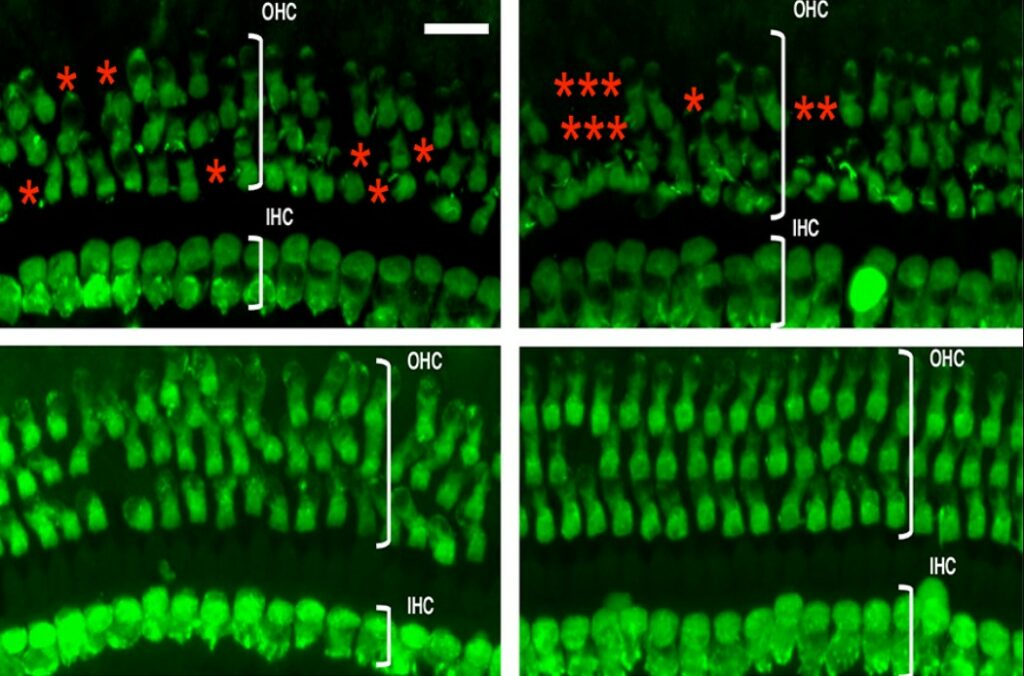In a groundbreaking study published in Science Translational Medicine, researchers demonstrated the potential of gene editing to restore hearing in adult mice with a form of inherited hearing loss. The research, led by Wenliang Zhu and his team, focused on a mutation in the microRNA-96 (MIR96) gene, known to cause autosomal dominant deafness-50 (DFNA50).
The team employed a CRISPR-Cas9 system, delivered via adeno-associated virus (AAV), to specifically target and erase the 14C>A mutation in the MIR96 gene. This innovative approach improved hearing and hair cell survival in both presymptomatic and symptomatic mice, showcasing the potential for long-term auditory function preservation.
The study, partly funded by the National Institutes of Health (NIH), is a significant step forward in the treatment of genetic hearing loss. Previous research had shown success in neonatal mice, but this study marks the first time gene editing has been successfully applied to the adult inner ear. The researchers optimized the CRISPR-Cas9 system to ensure efficient and specific mutation editing, achieving transient Cas9 expression without evidence of AAV genomic integration, indicating a favorable safety profile.

Researchers used gene editing to restore hearing in mice with inherited hearing loss due to a microRNA mutation. The top panels show images of inner ear hair cells (green) from untreated affected mice, with red asterisks marking missing hair cells crucial for hearing. The bottom panels depict treated mice, showing increased hair cell presence in the inner ear. Credit: Zhu et al., Sci. Trans. Med. 16, eadn0689 (2024)
The scientists developed a dual-AAV approach to target all known human MIR96 mutations, making the method highly adaptable for future clinical applications. Given the 100% homology between mouse and human MIR96 sequences, this strategy holds significant promise for treating patients with DFNA50.
Early intervention proved more beneficial, with younger mice showing greater improvement, underscoring the importance of timely treatment.
Gene Editing to Treat Hearing loss
The study also highlighted the safety of the intervention, as the delivery virus did not integrate into the genome of the infected cells, reducing potential side effects. Chen and his team created a mouse model that mimicked the human mutation and progressive hearing loss, allowing them to demonstrate sustained hearing restoration for at least nine months post-treatment.
Zheng-Yi Chen, DPhil., a key collaborator from Mass Eye and Ear in Boston, emphasized that this research serves as a proof-of-concept for using gene editing to treat adult-onset genetic hearing loss. The success of this approach in mice increases the likelihood of its effectiveness in humans, paving the way for future clinical trials.
“Gene editing is useful for this type of genetic deafness because only one gene copy mutation is needed to prevent the entire gene from working properly and causing disease. Using gene editing techniques, we prevented the mutation’s effects, essentially eliminating the bad gene copy. The normal gene copy continues to work, and this restores function to the gene.”
–Zheng-Yi Chen, DPhil., Mass Eye & Ear
This research opens new possibilities for treating various types of genetic deafness, as the developed method can target multiple MIR96 mutations. The team’s work builds on previous successes in gene therapy for other forms of genetic hearing loss, marking a new era of potential treatments for individuals with inherited auditory conditions.
The study received support from the NIH Common Fund’s Somatic Cell Genome Editing (SCGE) program, the National Institute on Deafness and other Communications Disorders, and the National Human Genome Research Institute. As research progresses, the potential for gene editing to revolutionize the treatment of genetic hearing loss becomes increasingly promising.
Citation
- Wenliang Zhu et al., “Targeted genome editing restores auditory function in adult mice with progressive hearing loss caused by a human microRNA mutation,” Sci. Transl. Med. 16, eadn0689 (2024). DOI: 10.1126/scitranslmed.adn0689
Source: NIH, Science Transl






